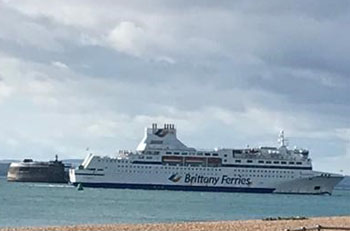The Government has signed agreements valued at £78m with four 'experienced' ferry operators to mitigate the risk of disruption ‘as the UK and EU adjust to new border processes at the end of the transition period’.
The announcement came ahead of a statement by the prime minister on Friday that with the EU unlikely to offer Britain a trade deal that is acceptable to his government, ‘we should get ready for 1 January with arrangements that are more like Australia’s, based on simple principles of global free trade’.

A Brittany Ferries vessel arrives at Portsmouth
The think tank Britain in a Changing Europe describes an Australian-style deal as ‘just code for no deal’ and business secretary Alok Sharma admitted it was 'a question of semantics'.
Unlike the case of Seaborne Freight last year, the latest agreement is with existing ferry operators – Brittany Ferries, DFDS, P&O and Stena.
The Department for Transport said the contracts are collectively worth £77.6m and provide capacity equivalent to over 3,000 HGVs per week, ensuring that ‘vital medical supplies and other critical goods will continue to be smoothly delivered into the UK whatever the outcome of negotiations with the EU’.
They will focus on nine routes serving eight ports in areas less likely to experience disruption. These are Felixstowe, Harwich, Hull, Newhaven, Poole, Portsmouth, Teesport and Tilbury.
Transport secretary Grant Shapps said: ‘Securing these contracts ensures that irrespective of the outcome of the negotiations, lifesaving medical supplies and other critical goods can continue to enter the UK from the moment we leave the EU.’
The contracts will be in place for up to six months after the end of the transition period.
They were awarded through the government’s Freight Capacity Framework, ‘which sees a shortlist of experienced freight operators bid for contracts’.
The framework, introduced in 2019, has a four-year life. ‘Should the contracts not be required, termination costs would reflect a fraction of the full contract amount,’ the DfT said.
Officials stressed that routes out of Dover and Folkestone ‘remain a vital corridor for trade between the UK and mainland Europe [and] have played a key role this year in maintaining the flow of critical goods into the country throughout the COVID-19 crisis’.
They added that the Government ‘continues to work with key local stakeholders and industry to prepare for the end of the transition period’.